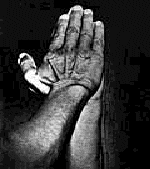

 | Think about your closest friend. Write about three aspects of your personality which you are prepared to 'reveal' to your friend. Revelation depends on trust. To what extent do you agree with this statement? Think about ways we reveal things about ourselves both subconsciously (without meaning to) and consciously (deliberately) e.g. through body - language, facial expressions, clothes, attitude and behaviour. Present the results to the class, explaining your ideas using examples. |
